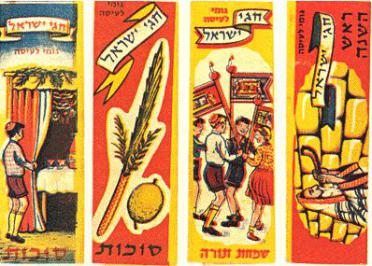Every week, parshaoftheweek.com brings you a rich selection of material on parshat hashavua, the weekly portion traditionally read in synagogues all over the world. Using both classic and contemporary material, we take a look at these portions in a fresh way, relating them to both ancient Jewish concerns as well as cutting-edge modern issues and topics. We also bring you material on the Jewish holidays, as well as insights into life cycle rituals and events...
In Biblical and Temple times, the holiday of Shavuot marked the opening of the harvest season and the bringing of the first fruits to Jerusalem. Today, it is more commonly celebrated as the holiday of the giving of the Torah on Mt. Sinai, which took place 50 days after the Exodus from Egypt. Here in Israel, Shavuot has become a gigantic dairy food festival, with ads and commercials running before the holiday for fancy cheeses, cheesecakes, recipe books, etc. The custom to eat dairy on this holiday, as opposed to the law to eat meat on all the other holidays (that's right, it is, in fact, a law, not a custom), is steeped in mystery and conjecture; no one really knows why we do it.
In addition to this culinary conundrum, there are a few other obvious questions which need to be asked about Shavuot. Why is it so short? Unlike the two other pilgrimage festivals, Passover and Sukkot, which are seven days long, Shavuot is just one day (traditionally celebrated as two in the Diaspora for technical, calendar-related reasons). Why so short? We couldn't take a week to celebrate the giving of the Torah, the most important event in Jewish history? And, as long as we are asking, why is there no ritual connected to it? On Passover there is the matzoh, the seder, the refraining from bread. On Sukkot, the sitting in the Sukkkah (booth) and the taking of the 4 species, lulav, etrog, hadass and arava. Shavuot has no ritual at all connected to the receiving of the Torah (the custom to stay up all night studying Torah is very late, and appears nowhere in the Rabbinic sources). Why does Shavuot get such a rotten deal? Why is it so empty of ritual? Why can't we even get a good, heavy, meat meal out of it; chicken soup, some chopped liver, a brisket, or a piece of roast chicken? Why is this one-day, ritually-challenged holiday also insulted by being celebrated with cottage cheese and sour cream?
As you know, the people of Israel received the Torah in the desert. The exact location of Mt. Sinai is unclear, but the Torah reminds us again and again - as it did at the opening of last week's portion Ba'midbar ("in the desert", which is the classical Hebrew name for the fourth of the five books of Moses, rather than the English "Numbers") - that it was given in the desert. The Rabbis note this, and have a whole series of drashot which explain that the desert is the appropriate place in which to hear the word of God, and receiving it there teaches us what we need to know and do in order to continue to receive, study and understand the Torah:"Why was the Torah given in the desert? To teach you that only if one makes oneself hefker (ownerless, unfettered, free), as the desert is, will one merit the words of the Torah.""Just as the desert has no end, so, too, the words of the Torah have no end...as its reward has no end.""Had the Torah been given in the Land of Israel, the Jewish people would have said to the nations of the world 'you have no share in it' so, rather, it was given in the desert, an ownerless place, so whoever wants it can come and get it."
These beautiful Midrsahim point to the desert as the right place for the Torah, and a model for the ongoing receiving of the Torah, precisely because of its lack of specific features, it's ownerlessness, openness, and absence of boundaries. Only someone who cultivates these characteristics can hope to receive, and to truly study and understand the Torah. Only someone who is unencumbered by preconceptions and prejudices, and is open to the infinite, universal possibilities and implications of the Torah - symboloized by the vast, open spaces of the desert in which it was given - can ever really hope to understand it.
The holiday of Shavuot reflects the need for this open, unfettered receptiveness. Just one day, concentrated, focused, emptied of all other concerns, unencumbered by ritual, by process, even by cold cuts or brisket, without any identity or character other than being set aside as the day to receive the Torah. This is the appropriate way to accept the Torah, to study and teach it. Shavuot's shortcomings are, in fact, its strengths, its lesson for all of us who would like to continue to receive and understand the word of God.
I wish you all an open, free, limitless, enjoyable and meaningful Shavuot, and encourage you to find a place in your area to study Torah tonight.
Chag sameach,
Rabbi Shimon Felix



Get inspired by Shavuot Divrei Torah from previous years